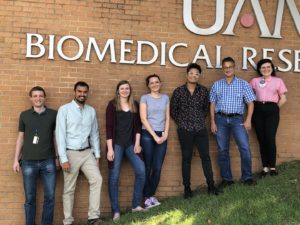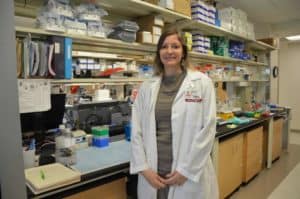Five UAMS scientists were awarded $15,000 each to fund research projects in the coming year, thanks to an endowment created by generous donors nearly four decades ago.
The Medical Research Endowment Fund was one of the first major fundraising campaigns of the UAMS Board of Advisors. Established in 1982 to stimulate and support research programs of UAMS faculty, the fund has received financial contributions from individuals, corporations and foundations. It’s a way for donors to make an immediate impact in valuable research at the ground level.
The awards are a vital bridge between the researchers’ initial ideas and major discoveries. By providing seed funding for research, individual researchers or teams can collect preliminary data and form hypotheses before seeking major research grants.
The grant awards provide seed funding for research that has the potential to develop into scientifically significant research projects. Grants support new areas of research for junior investigators and new lines of investigation for established faculty. Awards are made annually in early fall, with funds becoming available to each investigator in January. MRE funds provide for equipment, operating expenses and consultation costs for 12 months.
The grant awardees and their projects are:
- Alicia Byrd, Ph.D., assistant professor, Department of Biochemistry and Molecular Biology, College of Medicine; The Role of DNA Helicase B in Response to DNA Replication Stress
- Rupak Pathak, Ph.D., assistant professor, Division of Radiation Health, Department of Pharmaceutical Sciences, College of Pharmacy; Improving Efficacy and Safety of Prostate Cancer Radiotherapy with Mevalonate Pathway Inhibitors
- Youssef Aachoui, Ph.D., assistant professor, Department of Microbiology and Immunology, College of Medicine; Host-Pathogen Interplay Between Shigella and the Inflammasome
- Behjatolah “BJ” Karbassi, Ph.D., assistant professor, Department of Pathology, College of Medicine; Defining Tumor-Associated Glycans on Breast Cancer Cells that are Ligands for Macrophage SR-A
- Merideth Addicott, Ph.D., assistant professor, Department of Psychology, College of Medicine; Validating Electronic Nicotine Delivery System (END) Self-Reports Using Biochemical and Topographical Measures
Because of the generosity of donors who continue to support UAMS’ pioneering research efforts and the Medical Research Support Endowment Fund, hundreds of investigators have received funding totaling more than $3.1 million since the awards’ inception in 1982. Their return on investment has been significant, generating tens of millions of dollars in extramural funding.








